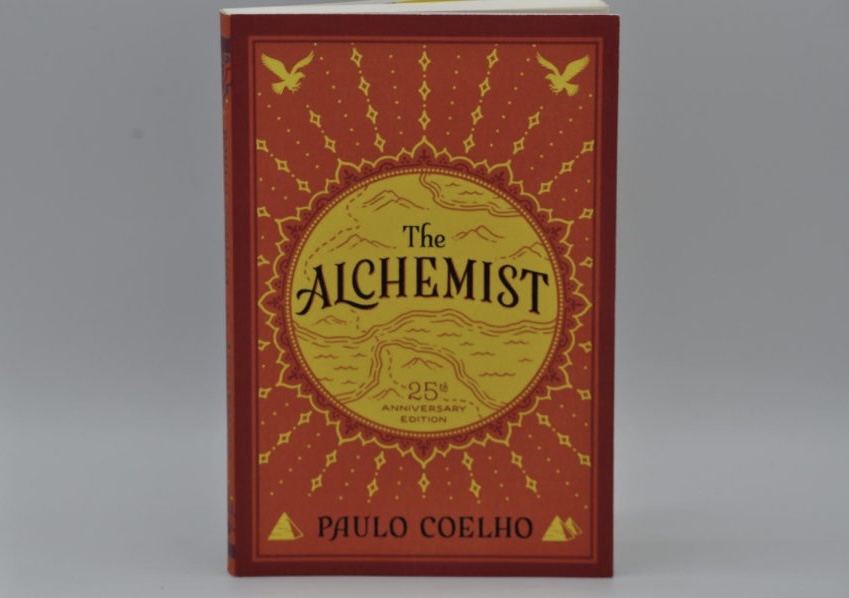The Alchemist poorly presents cliche messages and falls short of expectations
Paul Coelho’s well known classic follows a boy while on the journey to fulfill his “Personal Legend” and overall proves to be somewhat abrasive and relatively unremarkable
“‘I must have no fear of failure. It was my fear of failure that first kept me from attempting the Master Work.’” — Paulo Coelho, The Alchemist
I read The Alchemist by Paulo Coelho over the span of about two weeks for AP English Literature. I don’t blame this class for this assigned novel whatsoever — it was actually a choice novel. I’ve heard many positive reviews of the bestselling classic before and didn’t expect it to fall so short of expectations.
This novel follows a young shepherd boy, Santiago, who travels to the Egyptian Pyramids to locate a hidden treasure after an old disguised king convinces him that all the powers of the world would combine to assist in making the journey successful. Along the way Santiago learns about self-actualization, love, and the importance of destiny and fate.
There are many things that try to keep him from his destiny, which the old king refers to as his “Personal Legend”. He considers staying with his flock of sheep and continuing to tend to them, falls in love with a woman named Fatima who he wishes to stay in the desert with, and even has to get over his personal fears surrounding the journey to the pyramids.
Santiago eventually travels across the desert in search of this treasure.
The plot itself is incredibly cliche, and while I do understand that this book was written in the 1980s and officially set the cliche “hero on a journey to find material wealth, then realizes the wealth was ideological the whole time” story, it was still very poorly done and lacked any level of depth.
I would argue that, in general, other novels following this cliche storyline actually do it better than the “original”.
The messages integrated into the novel were painfully predictable: follow your dreams without fear, don’t let small things of the present hold you back from your true future, etc. But even messages like these could have been saved if they were written in a philosophical, indirect, and sophisticated style.
They weren’t. The lessons Santiago learns were stated bluntly and abrasively, completely unraveling any remotely interesting build up working towards one of Santiago’s unremarkable epiphanies.
Another difficult thing for me to look past is the fact that Santiago is practically the only actual character. All the others he meets along the journey (including Fatima, the old king, the alchemist, and the crystal merchant) are entirely allegorical. There is absolutely no existent character development.
I understand that this was intentional — these individuals weren’t supposed to have any actual traits, their only purpose was to be representative. But because Santiago is incredibly unmemorable, it’s really hard to continue reading when he’s the only actual character in the novel that moves the predictable plot along.
I get that The Alchemist is an American classic that set a lot of cliches and allegorical writing styles in place for future literature, and that would be okay if it was done well. It just wasn’t.
Overall, I would not recommend this novel. I would give The Alchemist a 1.5/5 star rating.
Your donation will support the student journalists of Mead High School. Your contribution will allow us to purchase equipment and cover our annual website hosting costs.

Arizona Lee is a senior, and this is her second year as Editor-in-Chief of The Mav. She enjoys reading, listening to good music, and spending time with friends. She hopes to guide the student newspaper and broadcast this year to continued success.







Mr. Parsons • Feb 8, 2022 at 11:10 am
I completely agree, Arizona! I’d heard so many people say they loved it, some going as far as saying it was their favorite book ever. I agree with every critique you make.
Rachel Long • Dec 18, 2021 at 10:37 am
I read this book for the first time a few years ago when I was a para in an English class. I really liked it on my first reading. I tried rereading it again last year and didn’t like it at all. I’m not sure what changed in me, but I’d be interested to see if anyone else had that same experience.
Kaylyn • Dec 16, 2021 at 9:36 am
I definitely agree with this I recently read it for English 12. It fell short of my expectations for a school novel
Mason McClellan • Dec 16, 2021 at 9:34 am
I though this was a very well written Arizona! Its really great how you where able to support everything you said with examples specific to the test. It was harsh in the best way possible/